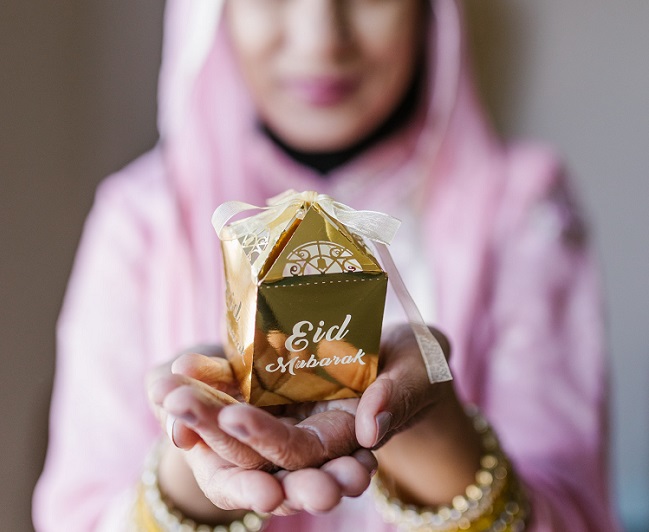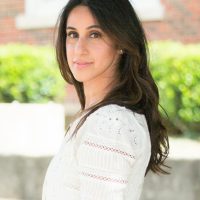Last month, I celebrated Eid-ul-Fitr, the Islamic holiday commencing the end of Ramadan, with my family.
It stoked a decades-old feeling that I find myself visiting annually:
A feeling of duality clashing with a desire for integration.
Why do I fold this feeling up neatly each year alongside the beautiful, traditional silk garments, and tuck it away until the following year?
The holiday included attending prayer at the mosque in our new clothes, having brunch with family afterward, and catching up with more family and friends via lots of FaceTime.
Memories captured through videos and pictures, my daughter showing off traditional henna on her hands by cupping her face or finding other creative, hand-centered poses. After all, it is a treat that she knows will soon wash off.
Most years we travel to my hometown to celebrate. This year, we stayed local. But every year we juggle life around Eid. That means taking a day off from work, sending an excused absence to school, and sometimes only taking the morning off as we’re unable to miss critical meetings. In any case, the emails and conference calls and school assignments are always there waiting.
The entire month of Ramadan in itself requires a specific kind of focus with altered sleep schedules and workout routines, and allowing a reset to the body by limiting food and water during daylight hours. The 30 days leading up to Eid, the day of, and the days after clearly require recharging, but all occur within the pace of regular life in the United States.
My sister and I wondered aloud how it would feel if we had an actual holiday break, similar to the winter break situated around Christmas and Hanukkah. Okay, fine—let’s not kid ourselves. But at least similar to Good Friday and Easter weekend would be nice.
It would definitely be less stressful and, more importantly, our kids could cherish it knowing that their friends and teachers have the knowledge of what they’re celebrating without it being just a blip on the radar.
The day after Eid, the kids are back at school fielding questions from their peers on why they were absent. The same questions I had to answer as a young girl:
What’s fasting?
What is that on your hands?
How do you say Eid Mubarak?
What does that mean?
It’s almost 40 years later, and we are still having the same conversations with teachers, neighbors, and friends!
My daughter, the eager, open child she is, took a real interest in Ramadan this year, begging to wake up for sehri (or suhoor), the morning meal before sunrise, and keep fast. My son wanted nothing to do with it. He just wanted to know why none of our neighbors or friends at school were doing it.
I found myself mustering up my own energy to follow through on the practice and be an example for my daughter. School days were completely off limits for a just-turned-six-year-old. Negotiations would begin on Friday night as I emphasized to my daughter the impact her lack of energy and hydration would have on Saturday morning’s soccer game. She would not have it. She persisted.
My husband and I woke the kids a little after 5 a.m. and, similar to my childhood experience, the sleepiness wore off within minutes. It became fun being the only ones awake partaking in this special intimacy.
During a quick morning prayer alone while everyone else crawled back into bed for another hour of sleep, I observed the beauty and serenity of that first line of white across the sky. A cherished hour for meditation and prayer of any kind for many people; a time when the realms of spirit and world are near. A time of intention that sets the remainder of the day.
My daughter’s first sip of water was around 10:30 a.m. I handed her a Pop-Tart as she walked from the parking lot to the soccer field. She was beaming. I knew that feeling of accomplishment well. There is something uniquely gratifying about the discipline required to fast and the commitment required to say yes.
My son, already having eaten his regular post-sunrise breakfast before arriving at the field, whined from the sidelines about how tired he was, insisting that would be his last wake up for sehri.
I also understood this part of my childhood experience as well: not wanting to change up the familiar and not wanting to be different from the broader society we observed.
The following Friday at school pick-up, we waved bye to friends rushing off to wherever we were going next. Upon another parent’s “have a good weekend,” my daughter replied, “I’m so excited to have sehri tomorrow.” The mom bent down to hear her better, clearly not having understood, and my daughter repeated it. She lifted her head up with a half smile looking at me to translate, which is a common occurrence amongst parents with kids, especially kindergartners.
I opened my mouth to explain but then, almost instinctively, covered the entire thing by saying something along the lines of, “Oh, she’s looking forward to a meal we are having.” The mom nodded, and off we went.
Later, this whole exchange kept gnawing at me, forcing me to reflect. I am in awe of my daughter and how open she is. And I am embarrassed at my missed opportunity for truth and openness.
At the time, I rationalized that it was too foreign a subject to explain from scratch as we both moved in opposite directions on the sidewalk with a crowd of children ready to get their weekend started.
But I know better. I know that stepping aside in the grass for a quick moment to explain what my daughter is looking forward to—what it is, what it signifies—would have only allowed our friend to know us more and know more, period.
Most of us are used to playing it safe and not rocking the boat. We keep our practice so close to our hearts that we just accept morsels of progress in the broader culture.
Decades of Islamophobia, we all know well, have trained this approach.
I realize there is more awareness around Ramadan and Eid within corporate culture, like accommodations available for those who fast, such as flex hours. My brother proudly listened to a virtual lunch and learn at his work about fasting during Ramadan. These steps cannot jump over their infancy, but what a long gestation period we’ve had.
As a community in the U.S., it seems some believe we don’t deserve recognized holidays for Eid at work and school and we are happy with any acknowledgment in exchange. For a secular country, America clearly leans Christian in tradition.
But a quick Google search shows there are about 3.5 million Muslims living in the U.S., with a global population of over 2 billion. Yep, that makes Islam the second-largest religion in the world, exceeded only by Christianity. It just blows my mind that my young children are experiencing the same “Huh?” that I did growing up, but then again, I keep experiencing the same “Huh?” even now.
But how much of this is my role? How much of it stems from an immigrant mindset or a minority mindset? Is it the chicken or the egg?
It can no longer be rationalized away that we went to school as first-generation immigrants with these closed-door experiences. There are second-generation (and third-generation) children now in school, in college, in the workforce, with full-fledged American parents.
Many of us have blended families and incorporate the holidays of more than one faith, and we share in various celebrations increasing our connectedness with people—greetings of Merry Christmas, Happy Easter, Yom Tov, Happy Chinese New Year, and Happy Diwali!
There are those of us who don’t practice the religious aspects much but hold dear the traditions.
It’s not about a litmus test of faith. It’s about people coming together, learning from one another, and moving toward a greater understanding of all.
And the responsibility lies with us all.
Because, ultimately, isn’t that a major tenet of religion?
~
Please consider Boosting our authors’ articles in their first week. Boosting can help them win Elephant’s Ecosystem and get paid for writing and sharing their story.
~











Read 10 comments and reply